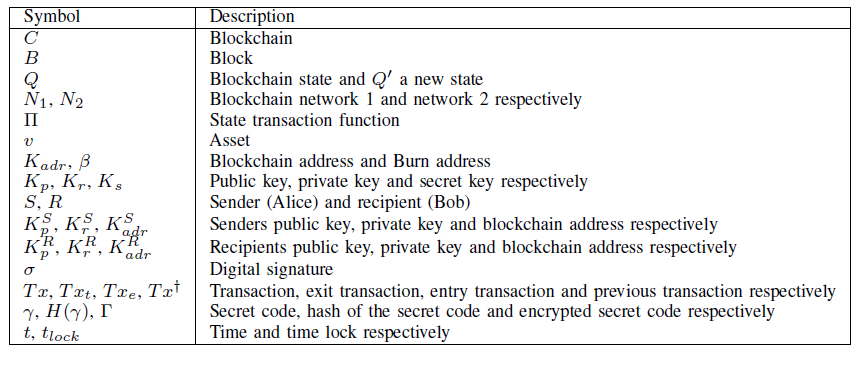Burn-to-claim is an open protocol developed by Griffith researchers that aims to address cross-blockchain asset transfer between networks of blockchain in a decentralised manner. The design is to transfer assets from one blockchain network to another in a way that it is being burned (destroyed) from one blockchain network and re-created on the other blockchain network. This protocol has two components: an exit transaction to generate a self-verifiable transfer-proof that the asset is burned on the source network and an entry transaction to verify the validity of transfer-proof and to re-create the asset in the destination network.
The exit-transaction is in the source chain and initiated by the sender. This execution verify the transaction then generates a conditional time-locked and publicly verifiable transfer-proof. We define this transfer-proof to be a committed cross-chain transaction. The conditional timelock means that the transaction output is time-locked in the source network while the transaction is in transit.
- Check the transaction-validity - checks the authenticity of the asset and the owner's ability to spend.
- Generate the transfer-proof - a proof that the asset exists and transfered burned to a burn address
- TimeLock transaction output is locked while the asset is in transit.
- The screat key
The entry-transaction is in the destination chain and initiated by the recipient. Upon presenting the transfer-proof, the destination network nodes verify the validity and correctness of the transfer-proof and execute the exchange. We assume that the recipient’s network nodes can validate the transfer-proof through an intermediary middleware mechanism.
SourceChain.sol is the main contract of in the source chain.DestinationChain.sol is the main contract of in the destination chain.ERC20.sol is an interface of the ERC20 standard for Ethereum tokens.This is typical ERC20 token contract. The token contract will transfer ERC20 token to the Source chain contract during the deployment. we will be using the transfer functions from token contract to transfer token berween accounts.
You need to install the following tools/packages:
- Clone the repository:
git clone ---urls--- - Install all dependencies:
npm install - Start Ganache:
Ganache-cli - Deploy the contracts:
truffle migrate - Run the tests:
truffle test
Test 1 - Token.sol, SourceChain.sol and DestinationChain.sol Contract deployed
Test 2 - Contract balance - Source chian has the balance
- Install truffle
- Install ganache https://truffleframework.com/ganache
- Launch and set the network ID to
8545
$ truffle install
$ truffle test
C:\_ethereum\ERC20_hashed-timelock_contract>truffle test
Using network 'development'.
Compiling your contracts...
===========================
> Compiling .\contracts\BurnToClaim.sol
> Compiling .\contracts\BurnToClaim_.sol
> Compiling .\contracts\Migrations.sol
> Compiling .\test\helper\AliceERC20.sol
> Compiling .\test\helper\GriffithToken.sol
> Compiling openzeppelin-solidity/contracts/token/ERC20/ERC20.sol
> Compiling openzeppelin-solidity\contracts\math\SafeMath.sol
> Compiling openzeppelin-solidity\contracts\token\ERC20\IERC20.sol
> Artifacts written to C:\Users\s5039917\AppData\Local\Temp\test-2020616-38144-5wirwo.rxlji
> Compiled successfully using:
- solc: 0.5.16+commit.9c3226ce.Emscripten.clang
Contract: Burn-To-Claim
√ exitTransaction() should create new contract and store correct details (304ms)
√ exitTransaction() should fail when no token transfer approved (209ms)
√ exitTransaction() should fail when token amount is 0 (166ms)
√ exitTransaction() should fail when tokens approved for some random account (318ms)
√ exitTransaction() should fail when the timelock is in the past (211ms)
√ exitTransaction() should reject a duplicate contract request (524ms)
√ entryTransaction() should send receiver funds when given the correct secret preimage (460ms)
√ entryTransaction() should fail if preimage does not hash to hashX (314ms)
√ entryTransaction() should fail after timelock expiry (2486ms)
√ reclaimTransaction() should pass after timelock expiry (2567ms)
√ reclaimTransaction() should fail before the timelock expiry (347ms)
√ getContract() returns empty record when contract doesn't exist (81ms)
We need a timelock for Ether ETH tokens
It requires some features that should be implemented to the contract
- Should be able to lock tokens, defined by the senter and period of time.
- Locked tokens should be able to be transferred by the senter during the lock time period.

